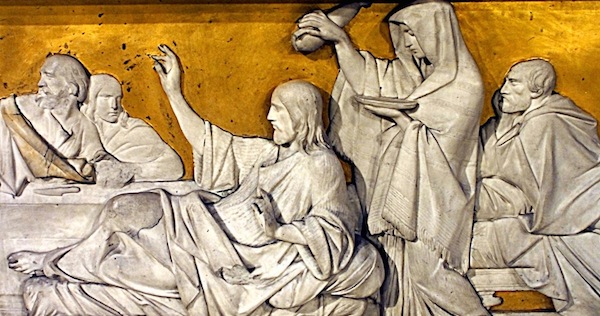The Passion According to St. Matthew Part II
Anointed for Burial
Read: Matthew 26:1-16
We jump ahead a few chapters now to Jesus' announcement of his death, his anointing at Bethany, and his betrayal by Judas.

After Jesus proclaims his coming death and the elders and chief priests plot to destroy him, Jesus is anointed. The tender scene at the house of Simon the Leper is a familiar one and it has its own unique cadences in Matthew's telling of the story. While the disciples complain in shock about the waste of such valuable oil and how the money could have been used to help the poor, Judas is not the one who makes the charge, nor are we told of his stealing from the common purse (See John 12). Judas is not mentioned until the next paragraph in which he sells out Jesus to the high priests and elders. What is going on in this story of the anointing? Jesus makes a proclamation that she has "prepared him for burial". Did the woman think that this is what she was doing? We must wonder at that. Given Jesus' royal entry into Jerusalem and the accusations leveled against him later that he claimed to be King of the Judeans, it seems more likely that she might have seen herself anointing him as a king. Of course, it would not typically have been a woman who fulfilled this role. In the Old Testament it was Nathan the Prophet who anointed David king (2 Samuel 12:7). But this is typical of how the story of Jesus overturns expectations and subverts traditional roles.
What I find intriguing, though, is that Jesus gives meaning to her act, perhaps a meaning that she, herself, did not perceive. We can presume that her act was one of love and faithfulness toward her master, and therefore was done with a loving and faithful heart. Yet, it is Jesus who provides the meaning and interprets the act of devotion. One might even say that by his word the anointing became a sacramental demonstration of his earlier proclamation about his coming death.
This leads me to wonder how much of the meaning of the present moment will only be known upon reflection and through the lens of Christ's Passion and Resurrection. We are beings that search for meaning, we are creatures who search for patterns, and our minds, our subconscious world, do not rest from searching for meaning. And in this search, new layers of meaning are always being unfurled. What meant one thing then now means quite another when we look back upon it with fresh eyes -- perhaps not a different meaning, but a deeper or broader meaning. A sign that we thought pointed in one direction may now point in many. New experience leads to new a perspective on what has gone before. For Christians, the lens that opens new layers of meaning is the Christ-event. Through Christ, with Christ, and in Christ, new meaning, new understanding, is always being revealed. Did the nameless woman anoint Jesus as king? Yes. Did she also anoint Jesus for burial? Yes, but perhaps she did not know it at the time. It was only through Jesus' interpretation and naming what she did that she actually knew what she had done, and that others could understood what she had done. More than that, we might even venture that in the act of doing what she thought was one thing, she discovered who she really was - a prophet.
When Matthew tells the story of the anointing, it is with a backward glance. We are not surprised, like the disciples at the meaning of the act, because we look back with the end of the story as our lens as we read or hear it read again. We have lost the name of prophet who anointed Jesus, but we remember her, always for being the one who ritually proclaimed his death and resurrection, and brought what was yet to come into the present moment. When we make our proclamation of Christ in troubling times, we are her heirs and successors.
This brings me to what I think is the crucial message for us today. We may not always understand what we do or why we do it, even when we think we do. We may not always have the eyes to see and ears to hear. We may not always be able to interpret our action as Jesus interpreted the prophet who anointed him. However, we can offer what we can with loving and compassionate hearts. We can proclaim our faith not only with our lips but in our lives. We can offer our selves, our souls, and bodies to be a reasonable, holy, and living sacrifice. If it is God's will, he will make something of it and something of us. Perhaps we will find our true meaning and purpose when God holds up the mirror to our faithful offering and reveals what it is really all about.
And what of poor Judas? He is to be pitied. He had Christ in his midst and sold him for thirty pieces of silver. Instead of offering him to the world for the healing of the nations, he turned him over to those who would destroy him, and for that, as we shall see, Judas did not come to a happy end. Yet, what man intended for evil, God used for good. God can even take a corrupt and sinful offering and make something out of it. God can take a twisted transaction and turn it around for the redemption of the world. This is good news indeed, for I am not sure if my offering resembles more that of she who anointed Jesus or the one who sold him for thirty pieces of silver. May Christ take what we offer, beautiful or inadequate, and make something of it.



Comments